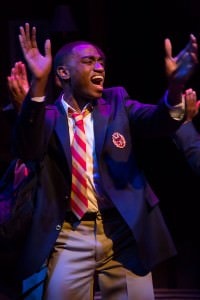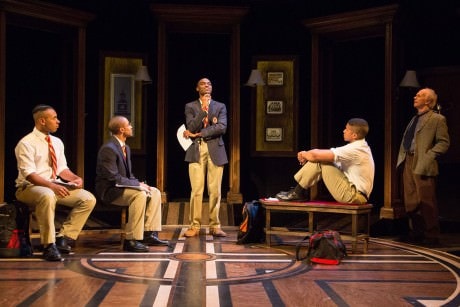There comes a scene in Choir Boy at The Studio Theatre when five young black men stand naked in dimly lit separate shower stalls singing “Sometimes I Feel Like a Motherless Child” in glorious harmony. As water streams down their sleek wet bodies, it’s as if they are just born, birthed in sorrow and isolation, abandoned to vulnerability, only connecting through the sound of their hearts’ common cry. It is a stage image so stunning in visual and aural beauty and metaphoric force that breath and time both seem to stop.

So it is that one cannot attend to Playwright Tarell Alvin McCraney’s superb Choir Boywithout sensing here a deeply felt imagination retelling in his own brilliant way the truth that #BlackLivesMatter.
McCraney has chosen as his contemporary context the fictional all-black Charles R. Drew Prep School and created within it five individuated student characters who all sing in the school’s choir. And sing they do, mostly gospel songs, always a cappella, with gloriously blended voices that Il Divo would envy.
With distant echoes of TV’s Glee, several story lines emerge in these characters’ lives, the central one being that of Pharus (Jelani Alladin), a lithe young man who because of his extraordinary vocal talent has been chosen to lead the choir but whose opening solo is interrupted by homophobic whispers about his effeminacy. His roommate, the athletically built Anthony (Jaysen Wright), is straight but accepting of Pharus, and uncommonly so. The relationship between Pharus and Anthony as it unfolds in their several scenes together was for me the most affecting and arresting of McCraney’s various narratives. At one point Anthony in a roughhousing mood straddles Pharus, kneels astride him as Pharus lies semi-helplessly on his back, and playfully tickles him mock-mercilessly. Pharus, whose sexual attraction to Anthony has been evident, suddenly and involuntarily ejaculates—and the aftermath of shame Pharus feels coupled with the embrace of Anthony’s unfazed friendship is among the show’s most powerful and moving moments.
McCraney’s meta-theme is these boys’ moral maturation into men, and Set Designer Jason Sherwood has placed the play in a circular space with old-school inlaid-wood flooring, sconce-lit panels, and heraldic shields overseen from high up the wall by gilt-framed portraits of great African-American men in history, among them President Obama.
Besides Pharus and Anthony, we meet Bobby (Keith Antone), the ne’er-do-well nephew of the stolid Headmaster Marrow (Marty Austin Lamar); class-jester Junior (Eric Lockley); and earnest, closeted David (Jonathan Burke), who has a shower scene with Pharus that is both steamy and shocking. Also factoring formatively in these young men’s lives is faculty member Mr. Pendleton (Alan Wade), an elderly white history professor whose own history includes civil rights activism and who in an impressively choreographed confrontation commands a student to stop using the N word (I lost friends behind that word, he painfully recalls).
There are no echoes here of Ferguson, no suggestion of the hostility these young men face once they step off campus where the N word kills. Choir Boy presents itself as family business, an airing of issues about masculinity and identity in an enclosed world of blacks valuing blacks.
So the show’s tone is never a howl of anger at white supremacy. Instead its tone follows its form, which is functionally musical theater. Though technically a play with music, Choir Boy plays and feels exactly like a succession of musical numbers with a book of intervening scenes—lots of great gospel, some clever contemporary rap and pop, all performed under the musical direction of Darius Smith so masterfully that there could easily be a cast recording (I’d buy it in a heartbeat).
But while the musical theater form is the Choir Boy’s formidable strength, therein also lies a disconcerting disconnect.
Director Kent Gash has ably staged McCraney’s work—the musical numbers (I’ll say it again:) are not to be missed—but the acting style adopted for the intervening scenes takes a little getting used to. It’s very “play to the balcony” Broadway, brisk and vaudeville-broad, almost sit-comy. Concision of pace is a plus in musical theater but the consequence here is that the actorly in-the-momentness one might expect (given the extraordinarily emotional depth of McCraney’s character arcs) seems in sparse supply. This limitation is to be expected, perhaps, when the engine driving a show is its crowd-pleasing musical numbers (and please the crowd they do—the predominantly white audience I was with applauded rapturously after every stirring number). Yet there’s an absence where the underlying soul aches in McCraney’s stories are not more palpably present.

There is an important conversation to be had that this production of Choir Boy prompts. It’s the large (and awkward and maybe messy) conversation about race in the DC theater landscape, about whether and how stories of black lives get to be told on local stages. By pointing to the instance of Choir Boy as a safe-for-white-consumption musical entertainment, cleansed of righteous and warranted Ferguson-fueled outrage, I do not mean to slight in any way the extraordinary talent and professionalism on display, Studio Theatre’s enlightened sincerity in producing the play, or McCraney’s authenticity of artistry. But as a writer who cares about the intersection of ethics and art in theater, I cannot but view this instance with reference to its resonance right now, in these times, when a national consensus is emerging that full and honest truth-telling about black lives, individuated and in the aggregate, matters more than ever.
There is an annual Black Theatre Festival in DC. From what I’ve seen of it (see links to my recent reviews below), it is unabashed in telling stories without reference to white people’s comfort zone. It’s also on the radar of almost no white theatergoers or theater writers I know. And the DC theater community ought to have a problem with that.
So by all means go see and hear Choir Boy. It is magnificent musical theater.
But then afterward, have a deep think.
Choir Boy plays through February 22, 2015 at The Studio Theatre – 1501 14th Street NW, in Washington, DC. For tickets, call the Box Office at (202) 332.3300, or purchase them online.
LINKS:
Read Michael Poandl’s review of Choir Boy on DCMetroTheaterArts.
Here’s the playlist of the songs and music of Choirboy.
DC Black Theatre Festival: ‘Seven Layers Captive’
DC Black Theatre Festival: ‘Somethin’ Like Eatonville’
DC Black Theatre Festival: ‘Confessions of a Homo Thug Porn Star’





